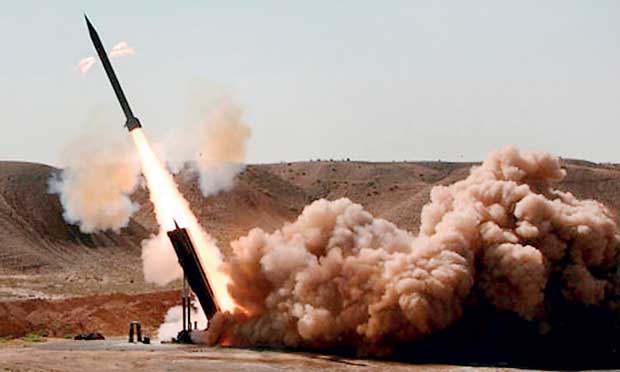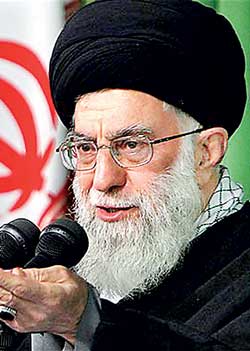
"In the final days of negotiations on Iran’s nuclear programme- meant to have been concluded on Tuesday but that will drag on until the end of the week- it appears to come down to this: Khamenei wants all sanctions removed immediately a deal is made; the US and its negotiating partners, the EU, Russia and China, (the latter two may not agree with the US but they are keeping quiet) want only to ease them"
According to the New York Times, “Ayatollah Ali Khamenei, who has the final word on all public matters in Iran, last week demanded that most sanctions be lifted before Tehran has dismantled part of its nuclear infrastructure and before international inspectors verify that the country is beginning to meet its commitments.”
“US Secretary of State John Kerry says the United States was prepared to ease sanctions before it fully resolves what, exactly, Iran’s nuclear scientists have been working on in secret for more than a decade.

“We’re not fixated on Iran specifically accounting for what they did at one point in time or another,” Mr. Kerry said. “It’s critical to us to know that going forward, those activities have been stopped, and that we can account for that in a legitimate way.’”
So in the final days of negotiations on Iran’s nuclear programme - meant to have been concluded on Tuesday but that will drag on until the end of the week- it appears to come down to this: Khamenei wants all sanctions removed immediately a deal is made; the US and its negotiating partners, the EU, Russia and China, (the latter two may not agree with the US but they are keeping quiet) want only to ease them.
Ayatollah’s other red line is more blurred. He says that international experts should not be allowed to “interrogate” scientists or “inspect” military sites. In fact the US and its allies have only demanded “access”.
To some extent Ayatollah is playing to his domestic audience. On the other hand it should be possible to achieve a reasonable compromise on the sanctions issue. The negotiators could agree to allow EU, UN and Russian sanctions to be lifted immediately a deal is done while the US engages in a more gradualist approach that depends on each step of the agreement being implemented. This is the only way for President Barack Obama to carry Congress with him. Public opinion will only swing to his side if this is seen clearly as America’s price for an agreement.
But what do the Iranians themselves feel? Are they behind Ayotallah?
A new public opinion study carried out jointly by the Tehran Centre for Public Opinion Research and Iranpoll.com, an independent Canadian opinion research firm, found that two thirds of Iran’s voting public do not trust the negotiators of the US and its allies. Large majorities have negative views of the US and the UK. On China and Germany voters are divided. On Russia and France modest majorities have an unfavourable view.
Only 40% believe that the US genuinely believes that Iran is trying to acquire nuclear weapons. Asked why the US is imposing sanctions on Iran, the most common answers portray the US as seeking to confront and dominate Iran. Only one in six believes that concessions would lead to a greater accommodation. (However this number is higher than an year ago and may have increased further now that a deal could be imminent.)
In other words Khamenei has the wind behind him if he decides to be intransigent.
That is the bad news. But the survey also gives a lot of good news.
A solid majority want their government to pursue a deal, but only on the understanding that sanctions be removed. Three quarters are optimistic that a deal will be made. At the same time an overwhelming majority continue to say that it is very important for Iran to have a nuclear programme for peaceful purposes. Iranians believe it is necessary for assuring Iran’s future energy needs once its oil runs out and for medical purposes. (The US, under President Barack Obama, has conceded this, which his predecessors didn’t.)
Interestingly, while half of the respondents say Iran should not agree to a deal unless the US lifts its sanctions, nearly as many say a deal should be made even if the US retains some sanctions provided UN, EU and Russian sanctions are lifted.
A large and growing majority of Iranians express opposition to nuclear weapons, saying that producing them is contrary to Islam- a position Khamenei has taken publicly on many occasions. This is consistent with the past stance on chemical weapons. During its long war with Iraq during the 1980s (Iraq had US support and help), Iran refused to use them on religious grounds, even though it had its back against the wall.
Having come so far it should be possible for negotiators to bridge the gap. The US is unlikely to have a future president as accommodating as Obama. Iran too is unlikely to have a leader as amenable as the present president, Hassan Rouhani. As for Khamenei the negotiators should have nothing too much to fear when he preaches again and again that building nuclear weapons goes against Allah. I, for one, believe him.

